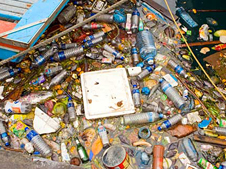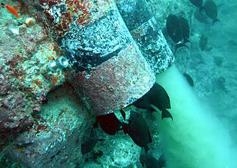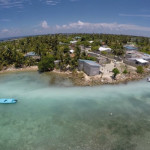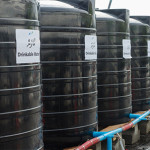Sewerage and contaminants infiltrating the water and reefs around Malé have been a concern for many years, but as the population grows, so does the amount of sewerage going into the water, and the health and environmental risks this could pose are spiralling.
Business Development Manager at the Malé Water and Sewerage Company (MWSC), Hassan Saeed, said waste in Malé is simply “disposed into the sea.”
He said at the moment there is no governing law that prohibits sewerage from being dumped into sea, and it is just being discharged at 50-100 metres below the surface.
Saeed said the seweage is not treated before being discharged, but is collected from households and then directed to the sea.
“So far it’s safe,” Saeed said. “We are discharging it into deep water and the currents take it away from the island.”
He said the MWSC has tested the waters near the swimming tract and artificial beach, and the Ministry of Health has also done independent studies.
He noted that the discharge pipes near the swimming areas have been extended up to 600 metres in length, to ensure they are taken further away from swimmers. “We have tested near the tract and we have found it is safe in that area,” he said.
The issue of safety had been raised before, he said, and added the government is looking into investing in treating the water.
“We are also ready to do that, the treatment of sewage,” he said, “but total investment is very high. We might have to ask the public to pay for it, it’s very costly.”
Saeed explained a lot of land space was needed for a water treatment plant and would require a high investment. He noted the project could also be carried out on a barge, if necessary, but said the cost for that would probably be higher than doing it on land.
“If we have to do it in a floating area, then we will need a lot of investment,” he added.

Medical concerns
Dr Abdul Azeez Yousuf from Malé Health Services Corporation said pollution in the water is a concern, since it is “a question of considerable contamination” and added there is “not an easy solution” to the problem.
He noted that since it’s not just sewerage in the water, but also many chemicals, it could cause many diseases, including ear and throat infections diarrhoeal diseases.
Dr Yousuf said the government had looked into the issue in the past and “have done some damage minimising” to improve the state of the water in the artificial beach and swimming tract.
The biggest problem, Dr Yousuf said, are all the boats in the harbour. “They don’t have proper sewerage disposal,” he said. “It goes straight into the sea.”
Medical doctor at the Central Clinic in Malé, Dr Ahmed Razee, said he has treated cases of gastro-enteritis caused by infections from the water.
“I am able to say very emphatically that yes, people can develop gastro-enteritis from swimming in Malé lagoon,” Dr Razee said.
He noted that “theoretically, the possibility [of getting gastro-enteritis] is very much real,” and “in medicine what we say is if something is possible, it will happen.”
But he added that “as far as the local population is concerned, and people who are continuing to go swimming, even if there was an infection, they would probably all have immunity to it, most of the common organisms.”
He explained it’s like traveller’s diarrhoea, “because you’re not [as vulnerable] to the germs that are in your surroundings.”
Dr Razee said the more “ominous thing is the presence of typhoid in the water and enteric organisms.” He said although enteric typhoid has been almost “wiped out” in Malé, “we do see some sporadic cases.”
He noted though, due to constant travelling between the Maldives and neighbouring Sri Lanka and India, “we cannot definitely say that the few cases we have seen have been locally infected.”
People get typhoid fever from contaminated water, Dr Razee explained, and noted it is a “bacteria which is excreted in the stool, so where the stool goes, the bacteria goes”.
He said “the waters are polluted with bacteria” that could cause digestive infections, and was mostly due to the boats in the customs area of Malé.
“There are a lot of boats which are more or less permanently moored there, and they are using the sea as a toilet,” he said. Additionally, “the sewage that is treated in Malé is not treated to eliminate bacteria, so it’s almost raw sewage, in an unrecognisable form, that is being let out into the sea.”
Dr Ramzee was considerably angry at those working in sewerage disposal. “These people are making so much profit, where is their social responsibility?”
“They, as professionals and scientists, know they are not doing what they are supposed to be scientifically doing,” he said, adding “it is the responsibility of the sewage company to ensure they do not pollute the water. They make millions of dollars out of these poor folks.”
Media Coordinator for Indira Gandhi Memorial Hospital (IGMH) Zeenath Ali Habib said “we haven’t got any cases regarding the matter” and it is “not a concern” for the hospital.
Environmental impact

Ali Rilwan from environmental NGO Bluepeace says his organisation is “concerned with the contamination from sewage” seeping into the coral around Malé reef.
Rilwan said “there are all sort of things” contaminating the water, including heavy metals. The contaminants are reaching Malé reef from five outlets, he said, noting that “the reef is decaying.”
Another major concern is these contaminants reaching people through the food chain; if the fish get infected, people who eat it could also be infected.
Photographs courtesy of bluepeacemaldives.org
 (0)Dislikes
(0)Dislikes (0)
(0)





Why does the public have to pay for this, MWSC is a profit making company, it as been operating for years.
Is it only the water around Male' that is getting contaminated......What about the city of Male' itself. What about the ever increasing number of vehicles which is causing air pollution, sound pollution, land pollution..... and still we go on as if nothing is happening. Almost every month one motor dealer imports more than 4-6 containers of motorcycles. Is this not a serious issue. When we talk about pollution, we are continuously contributing by throwing indiscriminately things such as cigarette butts, empty supari packets, empty can of the power drinks ...... and so on. Sure disposal of waste water and sewerage is a major issue.
Ms Laura, thank you for highlighting this problem. But why have you not obtained comments from the Malé Water & Sewerage Company? Have they got a solution in the pipeline? I hope they do have a plan now that they have Hitachi as a partner.
agree with Musketeer - why do we only talk about pollution in water. the pollution we dump into the air is enormous. we only talk about pollution when an authority appears on the wrong side. As indiciduals we cannot walk, we smoke like mad, have aircons etc etc. Canu imagine how much garbage we produce only from vehicles. we dont talk about this cos we dont see the shit we give to the environment. we cant let go of the privileges.